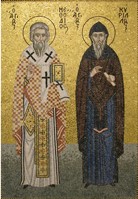
Russian researchers are inclined to believe that Cyril and Methodius were the Slavs, not the Greeks
Shortly before the Day of Slavic Literature, which is celebrated on May 24, the Presidential Library opened access to rare publications of the XIX century, dedicated to the appearance of Slavic Literature. Traditionally the Day of Slavic Literature and Culture is timed to coincide with the Day of a memory of the Saints Cyril and Methodius - the creators of Slavonic alphabet and language, and the Christian ecclesiasts.
Cyril and Methodius were deeply worshiped in ancient Russia. Their hagiographies were cited in the Primary Chronicle, also known as the Tale of Bygone Years of Lavrentievsky Chronicle - the ancient record of Russian history of the earth, the electronic copy of which adorns the Presidential Library stock. After the baptism of Russia a language that brothers have created has become the all-Slavic. Before the revolution the Day of Cyril and Methodius was celebrated annually in large cities and in faraway villages of Russia. In the middle of the XIX century the 1000th anniversary of the Slavic alphabet was commemorated publicly. At this time in Russia in the connection with the growing interest in the origins of the native culture, in particular in writing, there was a considerable amount of research work on the circumstances of life and the importance of Salonika brothers and all that they have done for the Russian culture.
According to the researchers, brother’s way was not strewn with roses at all, because besides a hard work on creation of the Slavic alphabet, they have also taken a part of adaptation of the Old Slavonic language to the church rituals, on which pontiffs and Latin cardinals reacted with offensive jealousy.
According to the historical and critical study of Joseph Dobrovsky of 1825 year’s edition Cyril and Methodius. Slovenia's Primary Teachers, “At their first time in Rome, Cyril and Methodius withheld the applied service in the Slovenian language, and therefore, the invention of the Slovenian literacy, so opposing from the essence of the Rome Court. This is certainly true, while we read in the bullae of Pope John VIII from 879 year, in which he is calls Methodius from his archbishopric in Rome for an response: "We heard, Pontiff says, that you chant a liturgy in the barbaric, that means, in Slovenian language." …Methodius with wisely arguments convinces Pope to solemnly allow a use of the Slovenian language in the liturgy."
Constantine Zelenetskiy in his writing On the Church Slavonic Language, its Origin, the Creators and the Historical Fate, published in 1846, sheds light on the circumstances under which the Cyrillic alphabet was invented and a translation of the Bible into Slavic languages was committed: "Church Slavonic dialect is one of the most remarkable phenomena in the history of the creation and development of the languages. All its very beginning it came from the interpretation of books of the Holy Scriptures and the church on one of the Slavic dialects of Southeastern branch. Therefore, the language of this adaptation in its spring had concluded a breathing innate word. In the book treatment the same phrases and expressions were added the words and the forms in Greek. A divinity of content has melted these two dissimilar natures into one language… And this language of orthodoxy has never remained the dead language, like the Latin West. Having started in the living word of the people, it never subsequently separated from it."
A disagreement on the origin of Cyril and Methodius among Slavic scholars already appears in the XIX century. In the most common version the brothers were Greeks. However, some authors insist on their Slavic origin. An entire study of the famous Russian scientist and journalist Mikhail Pogodin is devoted to this subject. His book St. Cyril and Methodius - the Slavs, not the Greeks, published in Moscow in 1864, little by little brings the reader to the conclusion that the holy brothers were Slavs, although there are no hard evidences to this: "The direct, positive evidences from the first sources are missing - as in favor of the Greek, so in favor of Slavic origin: we have to look for these through the reasoning and the assumptions. It seems to me that they were Slavs."
Vasiliy Aprilov in his 1841-year’s work entitled The Bulgarian Scribes, or Which Slavic Tribe, in fact, the Cyrillic Alphabet Belongs To?, in a well-argued manner supports the views of Pogodin: "Although the Bulgarians, but as the people of Thessalonica, and consequently the subjects of the emperor of Constantinople, Cyril and Methodius had the Roman names. A mistaken rule to refer to the Greeks as to the Romans has played fool with prospectors here, so they have identified Cyril and Methodius as the Greeks".
The contribution of Cyril and Methodius in the Slavic culture is great and determined the vector of its development for many centuries. In his 1885-year’s essay The History of Attempts to Solve the Issue of a Sole Literary Language of the Slavs the Slavic scientist Platon Kulakovskiy says: "It is hard to find in the history of culture equal to them giants, educational and outreach accomplishments of whom would leave such the great effect. Cyril and Methodius have initiated the idea of the literary unity of the Slavic peoples, so detached from each other in the future theirs history."
The Presidential Library website also presents the current researches on the invention and development of Slavic Literature. Professor, Doctor of Philology Dmitry Romanov within the Presidential Library’s video lectures had in 2013 a lecture entitled On the History of Cyril and Methodius Writing in Russia - it was added into the Presidential Library stock as well. All that is left to do is to come into line with the cited above conclusion of Slavonic scholar Platon Kulakovskiy, who determined an impact of Cyril and Methodius into the Slavic culture in terms of their educational and enlightening achievements as a giant.

